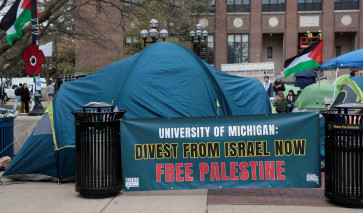Hans Kung: Encouraging interfaith dialogue
A proponent of religious dialogue, Swiss-theologian and Catholic priest Hans Küng is a highly respected ecumenical advocate and a controversial figure within the Catholic Church
Change Size

A
proponent of religious dialogue, Swiss-theologian and Catholic priest Hans Küng is a highly respected ecumenical advocate and a controversial figure within the Catholic Church.
He established the global ethics project, a global peace movement that started in the early 1990s to find shared values between religions and humanistic beliefs despite “dogmatic” differences. Küng is also an outspoken critic of the Roman Catholic Church and the current pope, Benedict XVI.
The 82-year-old recently visited Jakarta and gave seminars on global ethics, dogmatism and religious fundamentalism. Sitting in a hotel meeting room in Central Jakarta, the silver-haired controversial
priest talked to The Jakarta Post about his views on Catholicism today, the role of religion in a more secularized society, his calling towards priesthood and his belief in the existence of god.
Born in 1928, Küng said his decision to become a priest came at a very young age — in his early teenage years. He studied theology and philosophy at the Pontifical Gregorian University in Rome and was ordained in 1954.
He has been a firm advocate for church reform most of his life, becoming the first major Catholic theologian to reject the doctrine of papal infallibility. In 1971, he released a book Infallible? An Inquiry, in which he maintained that papal authority was made not by God but by man and was therefore reversible. This prompted the Vatican to rescind his ecclesiastical teaching permission in 1979 as Küng refused to withdraw his challenge against papal authority. Küng however continued to serve as a tenured professor of ecumenical theology at the University of Tübingen, Germany, and was also director of the Institute for Ecumenical Research until his retirement in 1996.
Recently, in conjunction with the fifth anniversary of the election of Benedict XVI as pope, Küng wrote an open letter to the church bishops published in the Irish Times, motivated by “profound concern for our church, which now finds itself in the worst credibility crisis since the Reformation”. The Catholic Church has been under a spotlight after revelations of clerical abuse of children and adolescents, in the US, Ireland and Germany.
He appealed to the bishops to set about reform and call for a council, a conference of bishops.
Both Küng and Ratzinger, now Pope Benedict XVI, were in the second Vatican council (1962 to 1965), the latest ecumenical meeting of bishops, which dealt with the Church and its relation to the modern world.
The Vatican II resulted in liturgical reform, religious freedom, ecumenism and inter-religious dialogue.
Küng deemed that Benedict had yet to make the spirit of the Second Vatican Council “the compass for the whole Catholic Church, including the Vatican itself”.
He said the problems with the Catholic Church had to do with papal absolutism, the role of clericalism and the law of celibacy. Clericalism placed the priest above everybody as a holy man, he added. “They are not holy men, they are servants of the people,” he said.
With regards to the law of celibacy, introduced in the 11th century, Küng said it should be abolished and that women should be allowed into the ordination. Küng added that although sexual abuses also happened in other institutions such as families and schools, it was prevalent in the Catholic Church under celibate leadership. In the New Testament, he pointed out, Jesus and Paul practiced celibacy but allowed full freedom in this matter to each individual.
He also said that the rule of celibacy had prevented thousands of people from entering priesthood, causing a lack of new blood in the Catholic Church.
While he advocated reform within the Catholic Church, he voiced the need to put aside fundamental differences and build bridges
with the goal of attaining world peace through dialogue based on shared values.
In the seminar on Monday, Küng elaborated the four basic principles that all religions shared: “You shall not kill, murder, torture, rape. In positive terms, this means to have respect for life. You shall not steal, exploit, bribe or corrupt, which translates in positive terms as dealing honestly and fairly. You shall not lie, deceive, forge or manipulate.
“In other words, you must speak and act truthfully. You shall not commit sexual immorality, cheat, humiliate or dishonor. In positive terms, this means to respect and love one another”.
Küng’s opponents might find his dissenting opinions on the Catholic Church un-Catholic. But Küng responded they might not have read his books thoroughly. Küng has written prolifically — two memoirs, books about Christianity, the Catholic Church, Islam, science and religion, and global ethics.
Religion still plays a role in society, despite the process of secularization, he went on, which came about as a result of progress in science, democracy, philosophy and industrialization.
The world is an invitation to think about God, he noted, “not in a sense of rational proof but by credible reasons… It should be seen as a cosmic vision, which can run side by side with very serious science.”
Religion will still hold a place for people to find out about the meaning of life, about suffering and how humans can overcome it, and also to think about life after death, he said.
While he has always been inquisitive and critical, Küng has never doubted the existence of God.
“I doubted more the argument of his existence, than God himself. As a matter of fact, I never had the idea that God cannot exist. I would have found it irrational. To think that everything just comes out from nothing is not a rational position,” he said.
“But I do not accept rational proofs for God because that’s another dimension. This other dimension you can have reasons to believe, reasonable arguments for believing God, but not rational proofs.”









